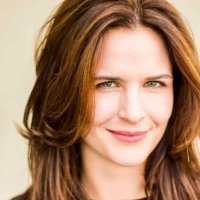
Written by Bianca Almada '16, Hannah Storm Journalism Intern and Glynn Family Honors Program Scholar
Anne Hamilton "04 did not always know she wanted to be a filmmaker. “I went to Notre Dame wanting to be a philosophy professor. That was my life plan,” Hamilton said with a chuckle.
But plans change, and now Hamilton is one of Hollywood’s top up-and-coming directors. She recently signed with William Morris Endeavor (WME) after the successful world premiere of American Fable, a feature film she wrote, directed, and co-produced. The film made its debut at Austin’s South by Southwest festival last month and generated a string of excellent reviews.
Set during the Midwest farm crisis of the 1980s, the fairytale thriller focuses on 11-year-old Gitty, who is faced with a dangerous choice when she discovers her father is holding a wealthy man for ransom in an abandoned silo.
“American Fable is a story of friendship and danger,” Hamilton said. “It tests the viewers’ concept of right and wrong and presents arguments for every character's perspective, which makes it such a strong story.”
Now that Hamilton has proven her directing chops, she’s in demand. She has been handed a big pile of scripts to choose from in order to determine her next project.
“It’s really great to be a director. I get to read all these stories and imagine what I would do with them to make them come to life,” Hamilton said.
Moving forward, she wants to focus on telling stories with strong female leads.
“I want to make a female-driven Hitchcock-style thriller next,” Hamilton said. “I want to show that a movie can be big while having a strong woman at its core who isn't a victim.”
Despite all her recent success, the road to finding her calling in film was not a conventional or easy one. After graduating from Notre Dame, Hamilton went on to study philosophy at the graduate level at Stanford University, still planning on becoming a professor. She then went on to Yale Law School with changed plans of becoming a lawyer after becoming interested in politics during a year spent in Berlin. But it was during law school that Hamilton felt the urge to become a director.
“I was working at a law firm over the summer and I wasn’t happy,” Hamilton said. “I knew I was interested in film but did not know how to pursue it or where to start.”
Hamilton said a conversation with her sister eventually gave her the push she needed to take initiative in the film industry. “My sister asked me point blank what I wanted to do with my life and my career, and she really put the fire under me to go for my dreams,” Hamilton said.
So Hamilton wrote a letter to Terrence Malick, the acclaimed director of one of her favorite movies, the war epicThe Thin Red Line (1998). With their shared backgrounds in philosophy, she thought they could make a valuable connection.
The communication led to Malick offering her an internship working on his next feature, the experimental dramaThe Tree of Life (2011).
A few years later, Hamilton had written an original short screenplay and saved a small amount of money to enroll in a film program in Los Angeles. She dropped out of the program after the first week and instead used the money to bring her screenplay to life.
“So often we ask for permission to do things when really we should just go do them,” Hamilton said. “I’ve learned so much that way, by taking risks and figuring things out for myself.”
Hamilton hired a cinematographer and directed Death Artists, Inc., her first short film. The short was released in the 2013 Cannes Film Festival Short Film Corner, and its positive reception earned Hamilton one of eight coveted spots in the American Film Institute’s prestigious Directing Workshop for Women. It was there that she wrote the screenplay for American Fable.
“Everything really came together in that film for the first time,” Hamilton said. “I feel grateful and excited about what's next.”
Though Hamilton strayed from her earlier plans to work in philosophy and then law, she said the study of both disciplines has helped her tremendously as a filmmaker.
“Philosophy tests our intuitions about what the truth and good are, while the study of law trains you to argue both sides of a viewpoint,” Hamilton said. “I think great films do both of these things, and that’s what I’m looking for in what I direct -- stories that challenge us to think differently about the world and ourselves.”Anne Hamilton